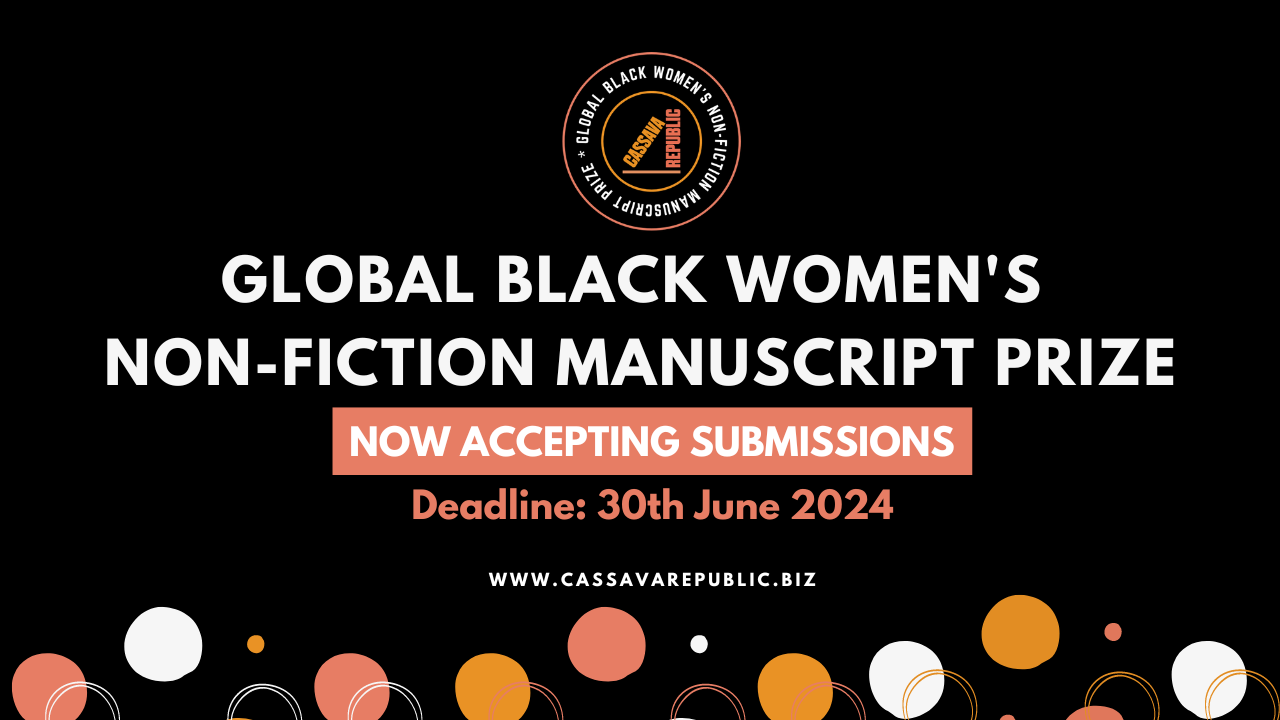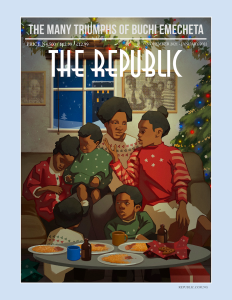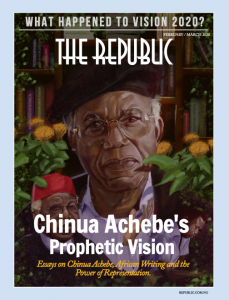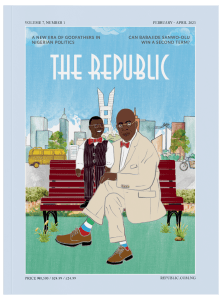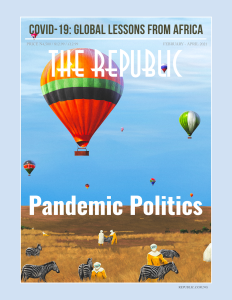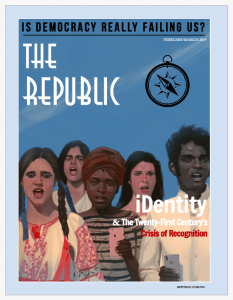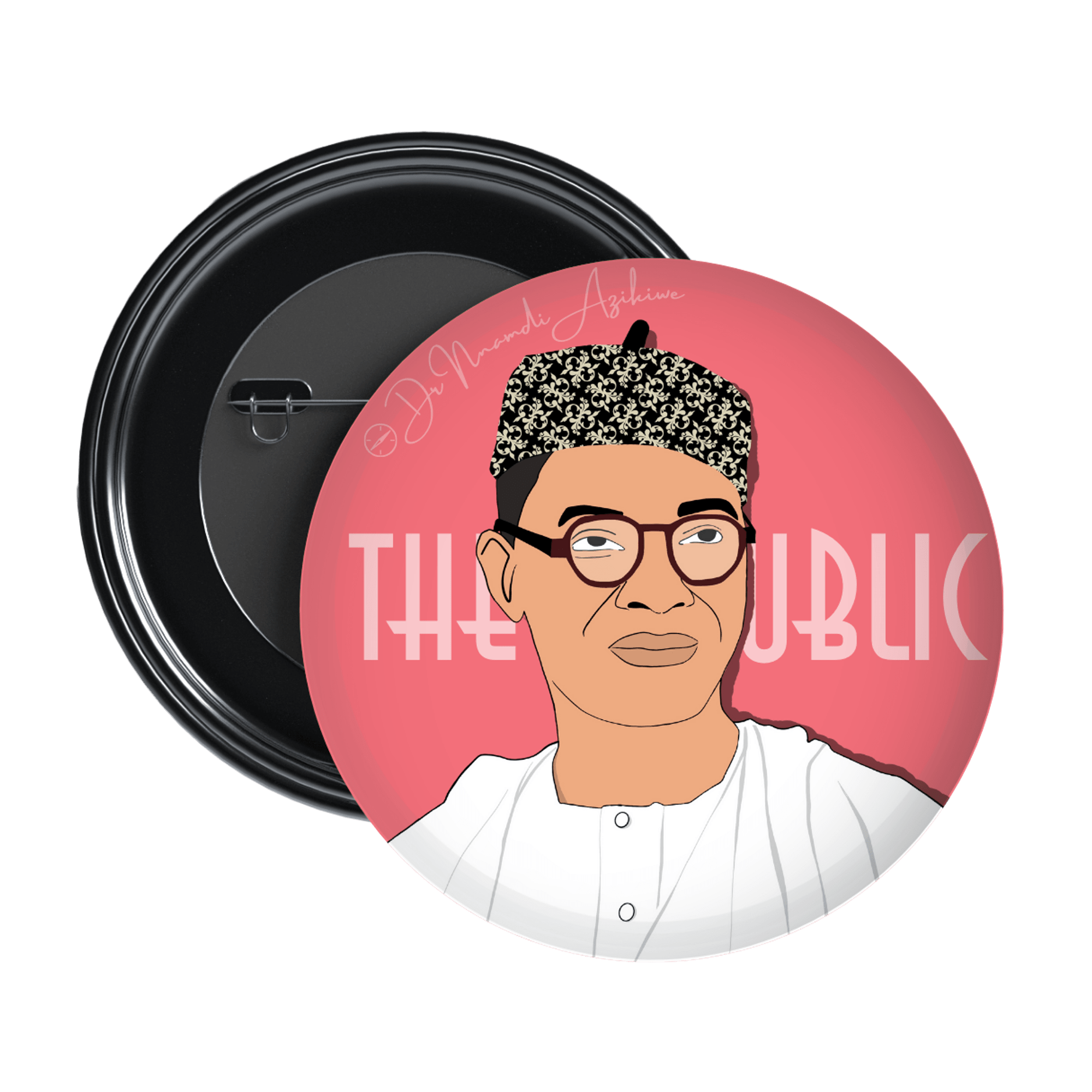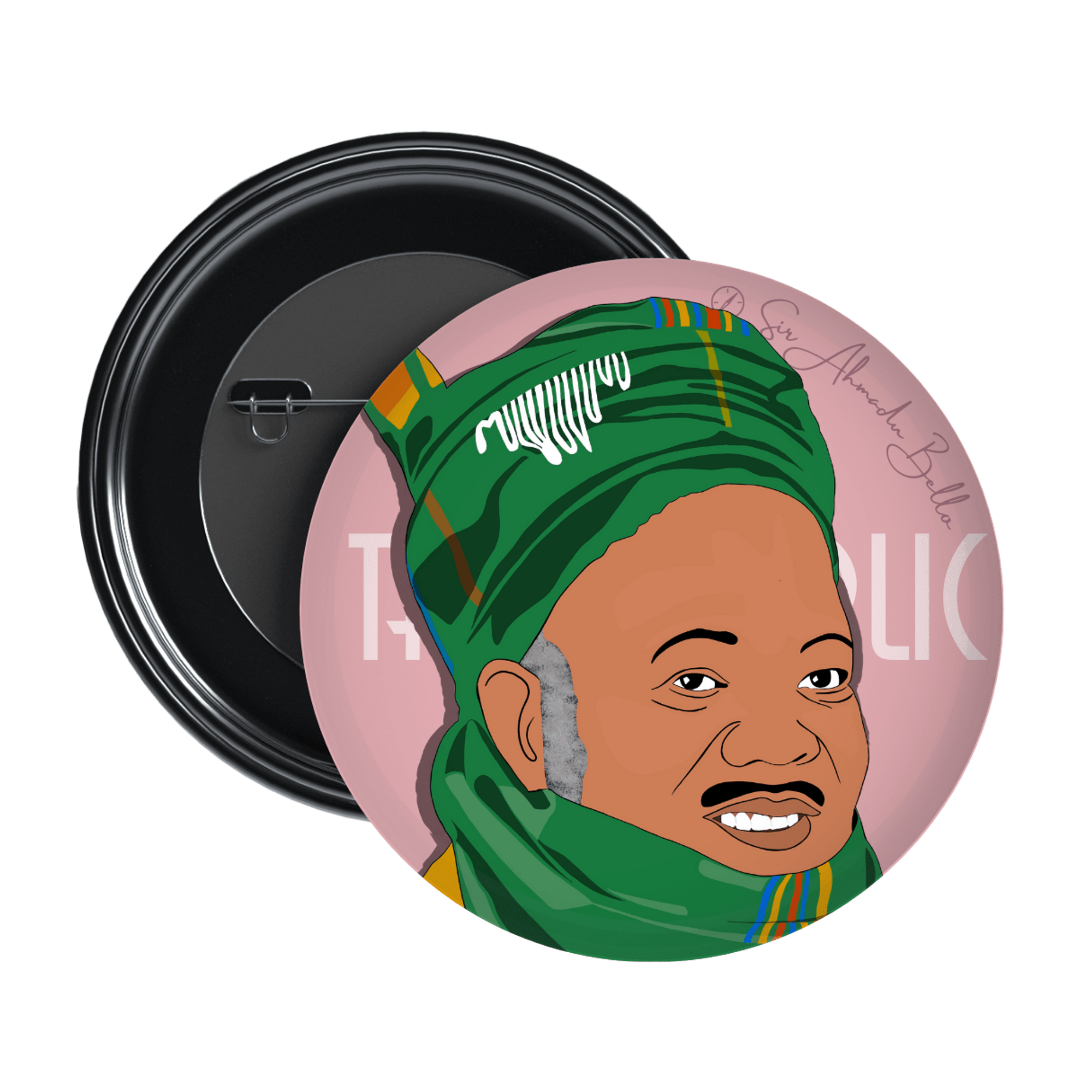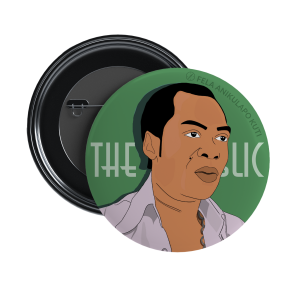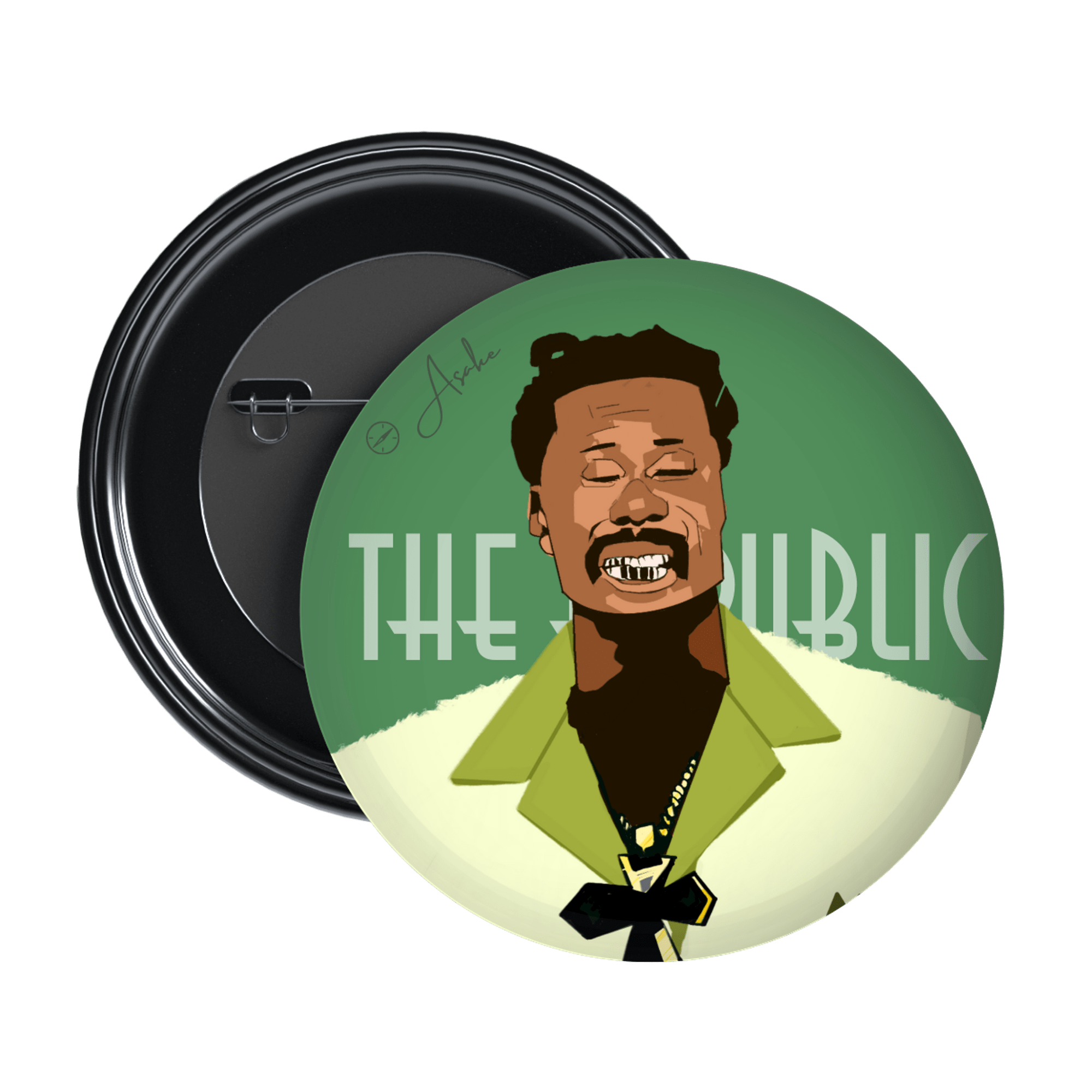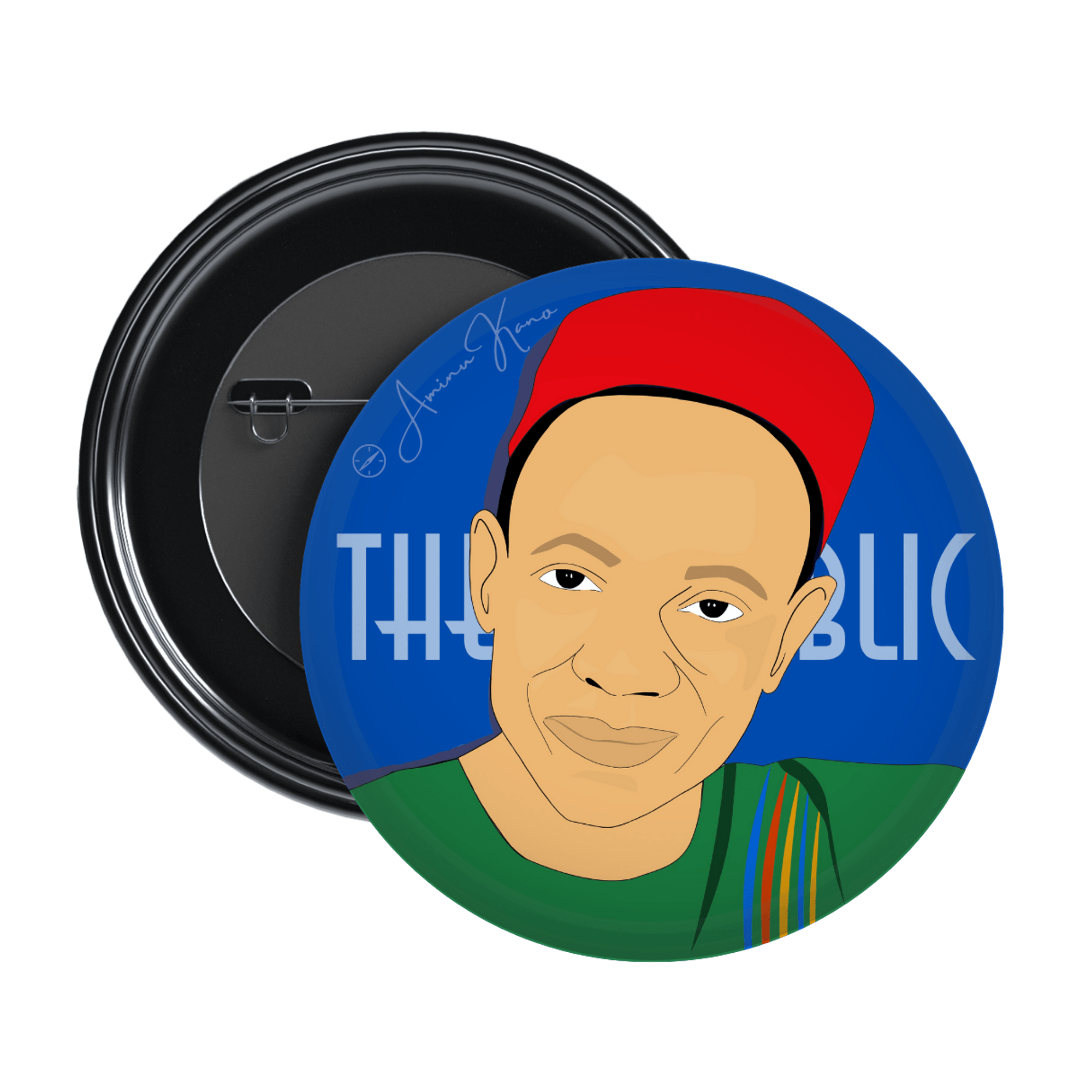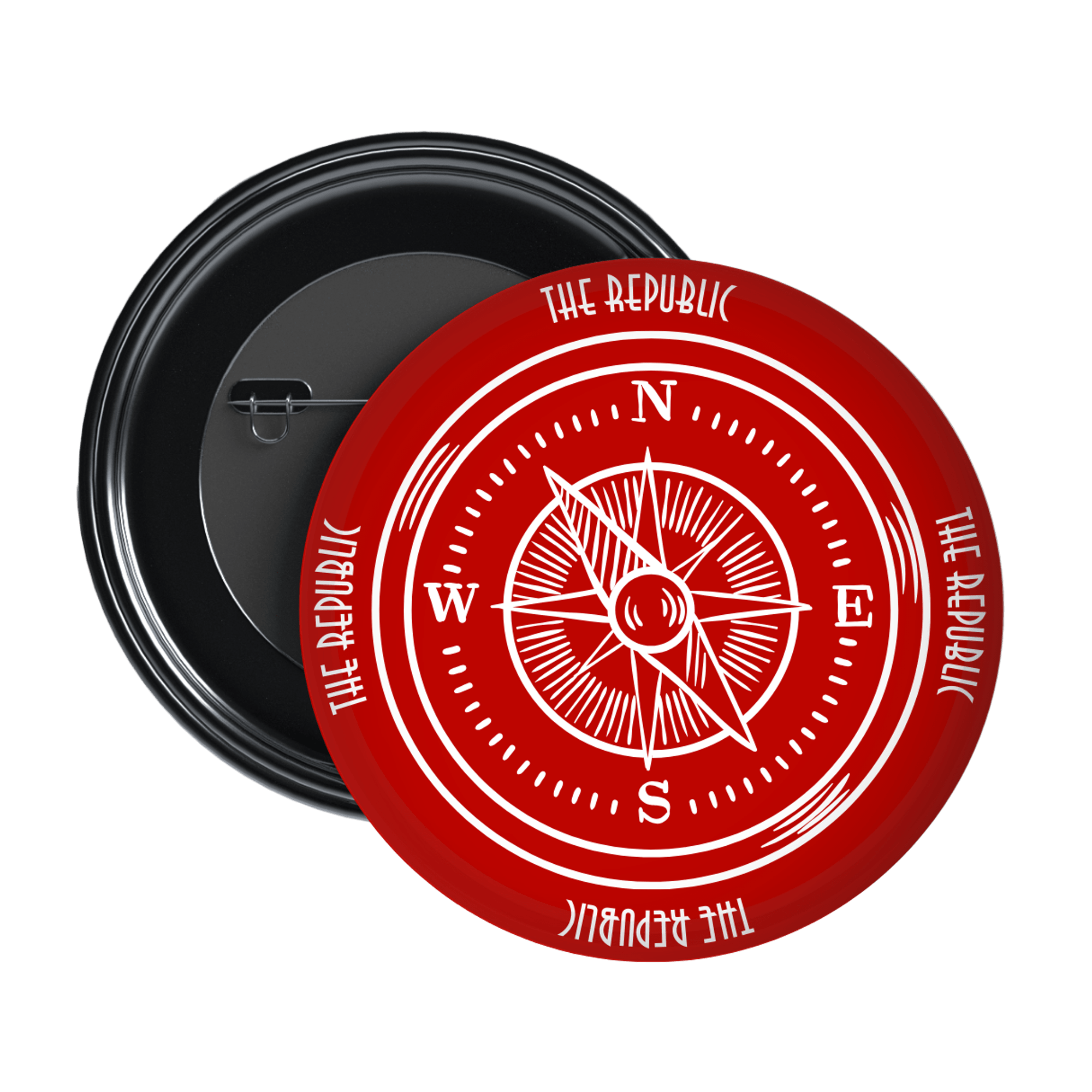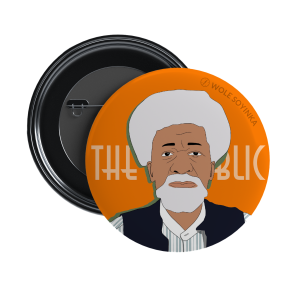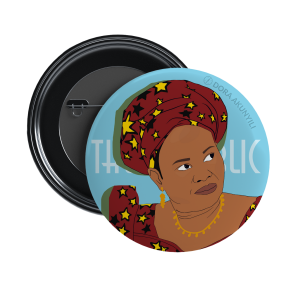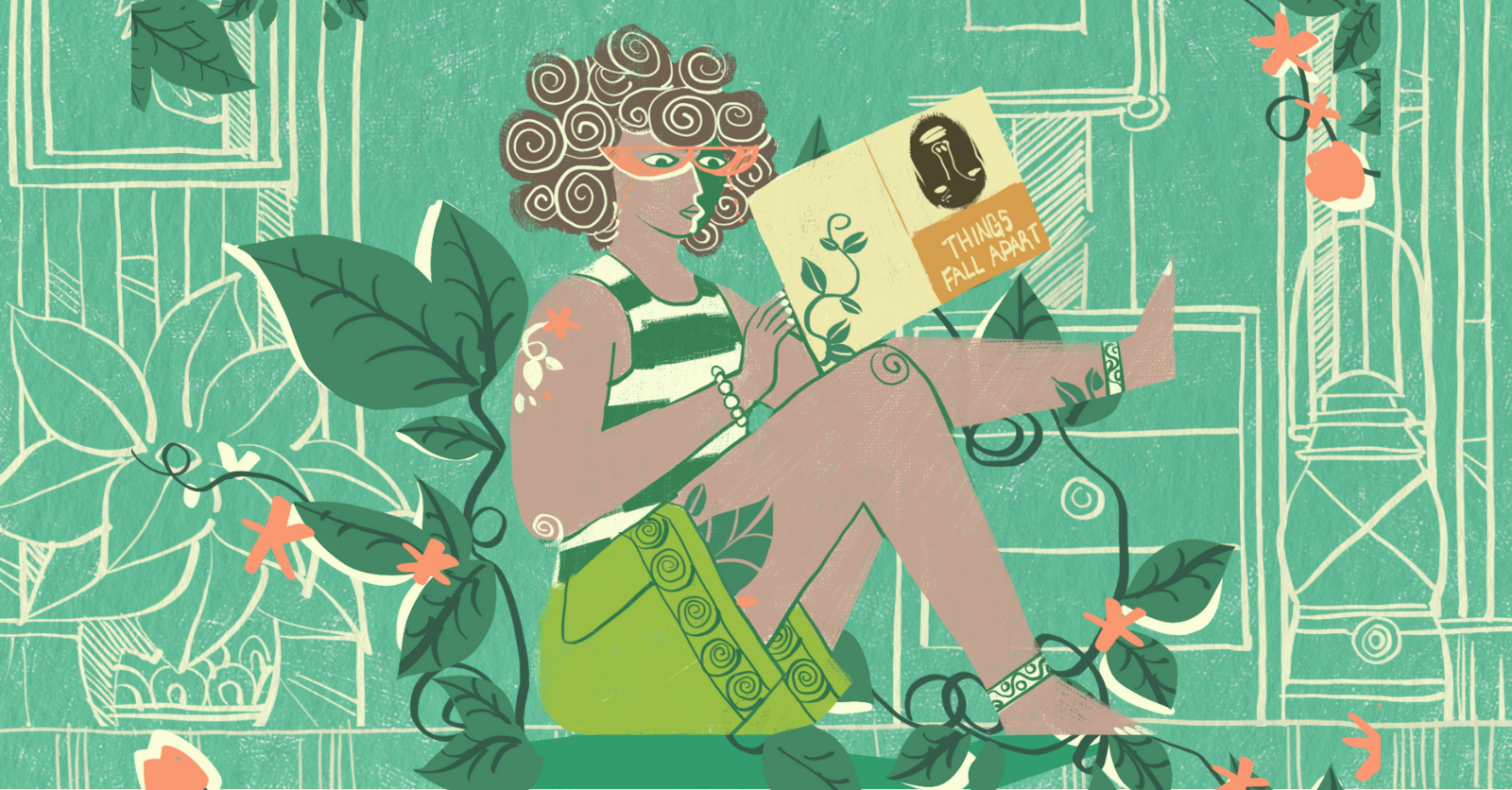
Illustration by Charles Owen (blvninjv) for The Republic.
the ministry of ARTS / BOOKS DEPT.
Reading the Great Nigerian Literary Debate

Illustration by Charles Owen (blvninjv) for The Republic.
the ministry of ARTS / BOOKS DEPT.
Reading the Great Nigerian Literary Debate
For the past five years, there have been many conversations around new Nigerian literature, which culminated in what is best described as ‘the great debates’ in 2023. From Carl Terver’s ‘Nigerian Essays of the Year (2019)’, Paul Liam’s ‘On Reading “Gathering of Spirits & Other Poems”’, Obakanse S. Lakanse’s ‘New Shifts in Nigerian Poetry’, Káyọ̀dé Fáníyì’s ‘A Fuller Portrait’, to ‘Why Poets Are Rascals’ by Liam, these essays were like stones thrown into vast oblivion; they went largely unacknowledged by the literary landscape of their time. The import of the conversations these essays were trying to have would not be known nor regarded as such until Oris Aigbokhaevbolo turned up with his controversial essay, ‘The Death of Nigerian Literature’, in February 2023. For all its bold pronouncements and pronounced shortcomings, its most important accomplishment is that it brought almost everyone who had anything to say about the current state of Nigerian literature to say their mind, either in support of his views or against them. Since the publication of that essay, Nigerian literature, as far as intellectual engagement in our literary circles across and beyond Nigeria is concerned, has been undergoing a sort of hopefully permanent remodelling.
2023: THE YEAR OF THE GREAT DEBATES
On 30 March 2023, over a month after the publication of Aigbokhaevbolo’s essay, the young maverick of Nigerian literature, Ernest O. Ògúnyẹmí, published an equally polemical treatise asking: ‘Is Contemporary Nigerian Poetry “Nigerian”?’ Ògúnyẹmí would answer in the negative. For one, Ògúnyẹmí does not ‘think “Nigerian poetry” exists, yet.’ This is because ‘[m]any of today’s Nigerian poets are working within a tradition that is not ours, a tradition that is mainly American.’ In my essay, ‘A Principle for the New Nigerian Poetry’ (SEVHAGE Publishers, 2023), I explain why this is essentially a misdiagnosis. Indeed, American confessional poets such as Sylvia Plath, Robert Lowell, and Anne Sexton, as Ògúnyẹmí and Lakanse before him argue, have a considerable influence on the new school of Nigerian poetry. However, national literatures across the world are not now so idiosyncratic in their techniques, poetics, and aesthetics as to differentiate them convincingly. For instance, I was recently reading Antonella Anedda’s book of poems, Historiae (NYRB, 2023) translated from the Italian and Sardinian by Patrizio Ceccagnoli and Susan Stewart, and if not that the edition is bilingual, there is no way I or anyone could tell that such poems in the book as ‘In Front of the Closets of the Dead’, ‘Lisbo 2015’, and ‘December’ are inherently Italian in translation. Or American for that matter, which is the immediate cultural idiom of its two translators. Although self-contradictions would seep into the essay when Ògúnyẹmí declares the likes of J. K. Anowe, D. M. Aderibigbe, and Pamilerin Jacob as writing ‘thoroughly Nigerian poetry’, it is impossible to overcast the accomplishment of the essay with criticisms as petty and invertebrate as the ones directed at its acerbic tone and structure.
In ‘The Miseducation of Nigerian Poets’, the essayist, Michael Chiedoziem Chukwudera, enters the conversation from a similar perspective as Ògúnyẹmí, with the same diagnosis that this vocational miseducation is American-born. While Ògúnyẹmí gives a detailed account and examples of what Nigerian poetry was, has been, and should be—the same way Chukwudera does of what it has been at the beginning of his essay, albeit in a summarizing facture—Chukwudera’s exegesis has a chronological structure to it. He begins with the discussion of the Nigerian traits in poems of the first three generations, namely J. P. Clark-Bekederemo’s ‘Ibadan’, Christopher Okigbo’s poems in Labyrinths, Wole Soyinka’s ‘Telephone Conversation’, Niyi Osundare’s ‘Not My Business’, and Kanma Oduwegwu’s ‘Their Fates Might be Mine’ [sic]. Also, he argues that our new poets’ discovery of foreign literary magazines, which is a considerably good thing for Nigerian literature and its performers, is not all perfect. In hindsight, according to Chukwudera, this discovery ‘became a correspondent to the American literary magazine culture… [which] resulted in a situation where many poets began to write similar poems about similar issues and, worse, with similar diction.’ But more on this later.
For once in recent Nigerian intellectual history, our literary intellectuals showed great restraint against silence as well as ideational uniformity. For once, each interlocutor of the great debates refrained from regurgitating the earlier analysis and judgements on the issue of the disintegration of cultural authenticity from our literary process. With almost every essay coming out against or for the issue at hand, the next always addressed the issue from a different perspective that, if not completely unique, was at least well-grounded. Out of this admirable intellectual tradition, came such an essay as Bestman Michael Osemudiamen’s ‘Much Ado About the Criticism of Fourth Generation Nigerian Poetry’ which, I think, has made not only the most important but the most convincing argument yet on why Nigerian literature is in its current state. The core of Osemudiamen’s argument is that culture, which our new literature is lacking according to critics like Ògúnyẹmí, ‘evolves side-by-side with societal organisation—both on political, economic, and social grounds,’ which ‘reflect on the consciousness of the poet and critic.’
Each response that comes after Aigbokhaevbolo’s essay has engaged in purely theoretical arguments on what Nigerian literature is or should be. For instance, Ògúnyẹmí’s and Chukwudera’s projects have, as their unpronounced ambition, an attempt to change the ways our new writers go about expressing themselves. Their ‘nativistic’ tendencies—to use Kanyinsọla Olorunnisola’s nomenclature in ‘Our Literature Has Died Again’—want our new literature to be more Nigerian according to how both of these critics define it. ‘I aim to inspire consciousness about the artistic forces that elude the poets of my generation,’ writes Chukwudera towards the end of his essay. Meanwhile, the transformative tone adopted by the aforementioned critics is also inflected in Oko Owi Ocho’s challenging-to-follow retort to the great debate in ‘The Crisis of Interpretation and the Temper of New Nigerian Poetry’, an essay in which the critic concerns himself with ‘the link between the poets of the third generation, and the emergence of the fourth at the interstice where they converge and depart.’ I agree with Osemudiamen’s judgement that Ocho’s treatment of this concern is somewhat unsatisfactory. For instance, Ocho claims the ‘intention of this essay is to show the missing link that led to where we are today’, but I do not see how his analysis of the historical relation between the third and fourth generations improves upon or corrects, as he asserts, the thematic and stylistic analyses of our new literature by Liam and Terver respectively, both analyses Ocho curiously judges to misunderstand their subjects. ‘Though evaluative at its best’, Osemudiamen also notes, ‘his essay still falls short of the same problem it raises: “the crisis of historical consciousness and clarity of ideas.”’
shop the republic
-
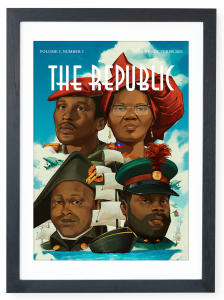 ₦70,000.00 – ₦75,000.00Select options This product has multiple variants. The options may be chosen on the product page
₦70,000.00 – ₦75,000.00Select options This product has multiple variants. The options may be chosen on the product page -
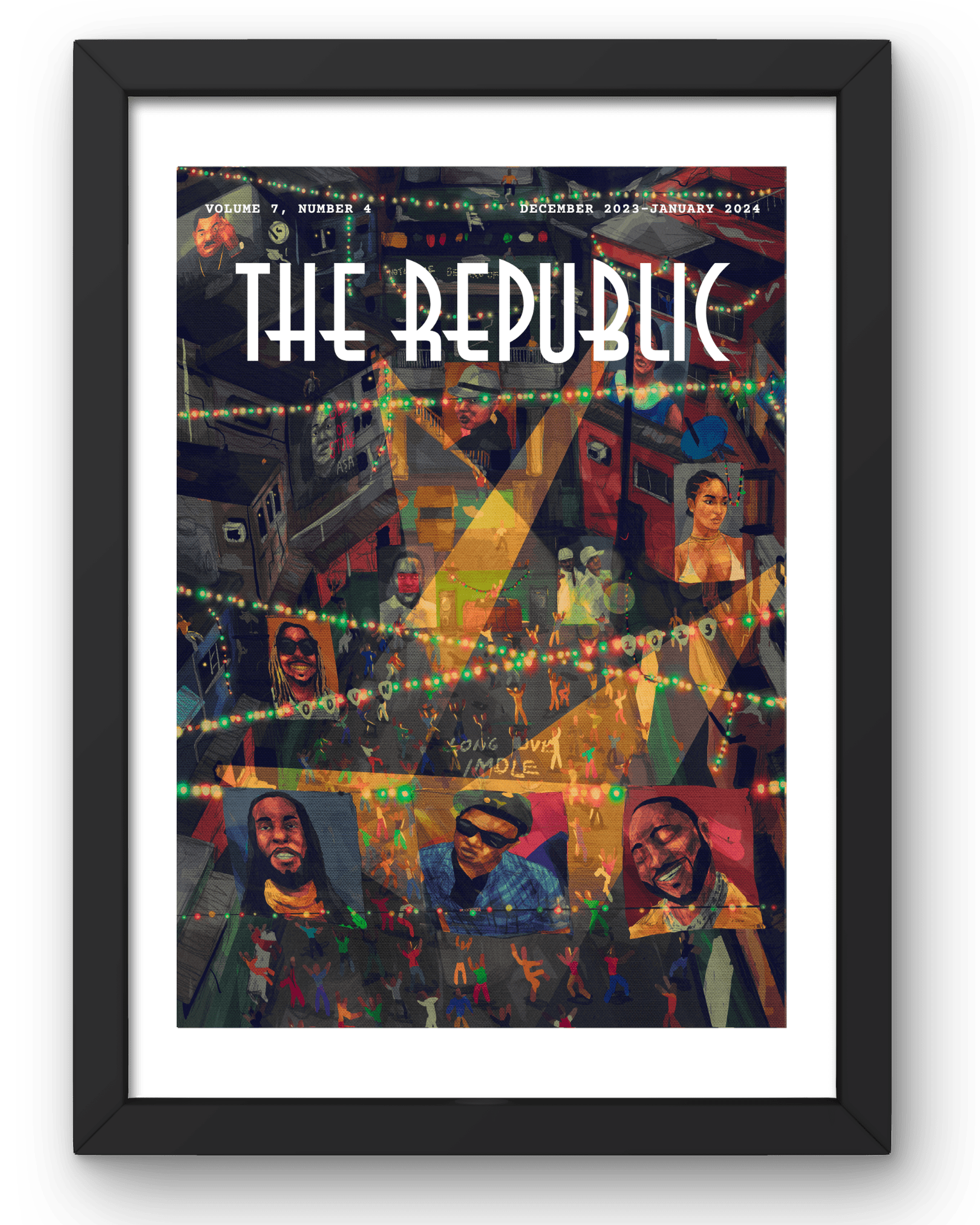 ₦70,000.00 – ₦75,000.00Select options This product has multiple variants. The options may be chosen on the product page
₦70,000.00 – ₦75,000.00Select options This product has multiple variants. The options may be chosen on the product page -
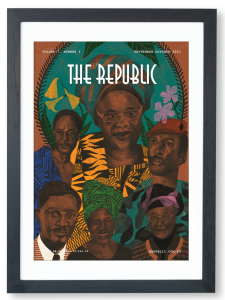 ₦70,000.00 – ₦75,000.00Select options This product has multiple variants. The options may be chosen on the product page
₦70,000.00 – ₦75,000.00Select options This product has multiple variants. The options may be chosen on the product page -
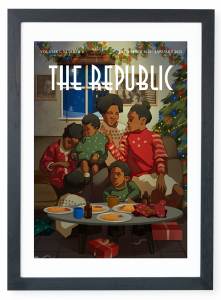 ₦70,000.00 – ₦75,000.00Select options This product has multiple variants. The options may be chosen on the product page
₦70,000.00 – ₦75,000.00Select options This product has multiple variants. The options may be chosen on the product page
shop the republic
-
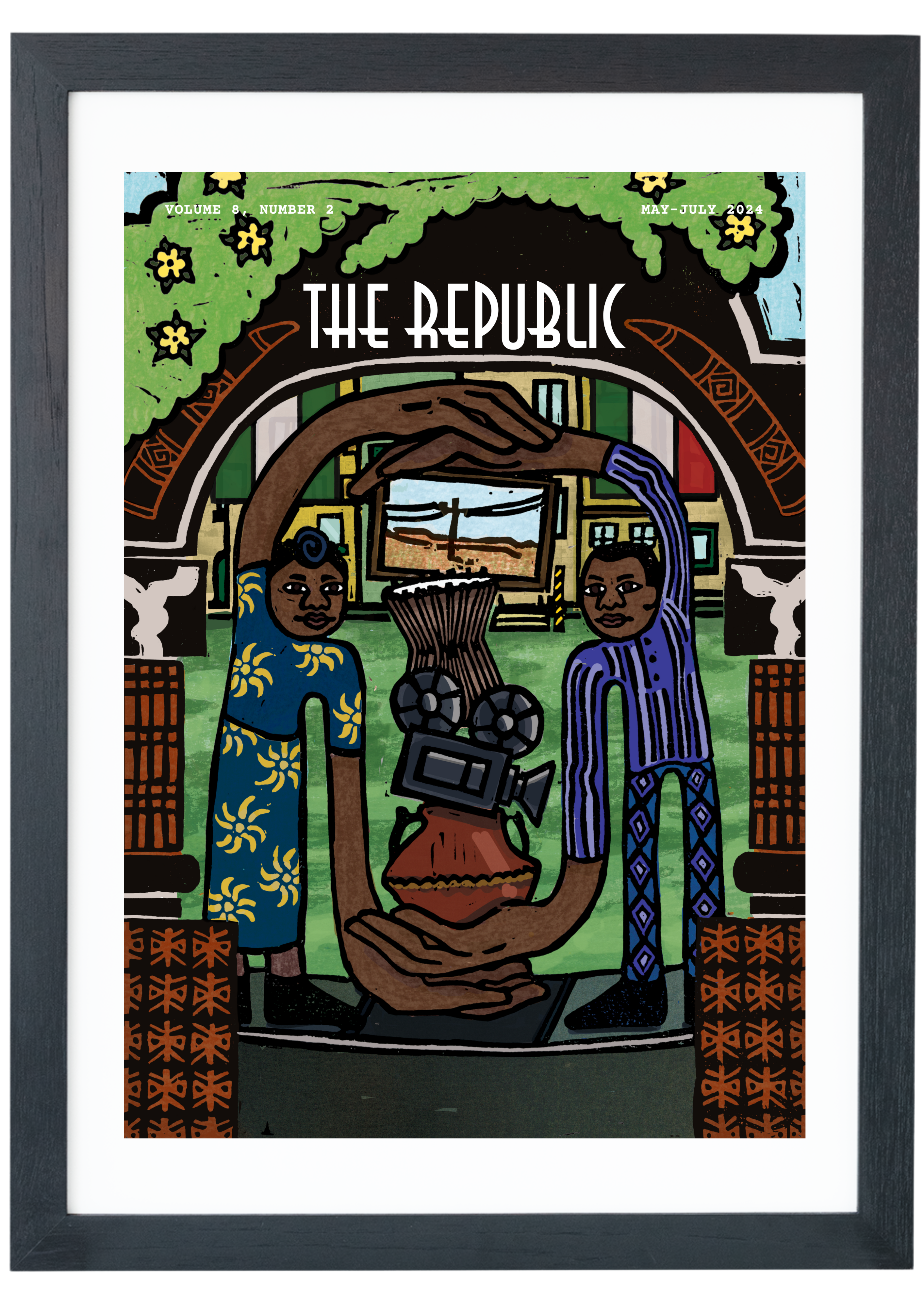 ₦140,000.00 – ₦150,000.00Select options This product has multiple variants. The options may be chosen on the product page
₦140,000.00 – ₦150,000.00Select options This product has multiple variants. The options may be chosen on the product page
However, against these critical idealisms, Osemudiamen shows, by way of the Marxist approach of dialectical materialism, why all these transformative ambitions against the status quo of literary Nigeria are almost impossible to accomplish. Unarguably the most pragmatically minded argument yet on the issue after Aigbokhaevbolo’s, Osemudiamen’s essay moves away from the theoretical views of the guardians and performers of the arts, from the critics and writers, to the most important consumers, at least in the commercial sense, of literature: the common readers—the reading public who have no professional inclination to write about what they read but merely read to enjoy and perhaps discuss their readings with their reading relations. In his grounded view, Osemudiamen feels we are also ‘ignoring the class relations that bind writers, and even critics,’ since ‘what matters to the [Nigerian] poet,’ according to Ocho, ‘is survival rather than the value of poetry to the development of society.’
Given Osemudiamen’s convincing argument about the culturally transformative effect of globalization and its progressiveness, I believe it follows that faulting our writers for ceding their national consciousness for the expression of their immediate one in their literary performance is an engagement in critical futility. What this says, at least to me, in our aim to practice serious criticism, is that we should devise new criteria against which to read, evaluate, and discuss our new writing beyond our writers’ acquired freedom from their cultural imagination. This is the point of engagement in the third section of Olorunnisola’s essay and Kéchi Nne Nomu’s ‘Who’s Afraid of Nigerian Literature?’ Faintly considered by Nomu as ‘a response to the accusation of leaving Nigeria’, Nomu’s essay also doubles as an apologia for immigrant reality and how it affects the literary production of our writers in the diaspora. This new reality and its influence on literary consciousness is precisely why our critical criteria need to be reconsidered, however ‘limiting’ the new criticism still might be as a system of ‘value assignation and canon-making’ to Nomu and other writers that share her sentiment.
For this re-evaluation of criteria, I bring you John Crowe Ransom’s remark on aesthetics in his 1938 seminal essay, ‘Poets Without Laurels’, from his book The World’s Body. ‘The union of beauty with goodness and truth has been common enough to be regarded as natural,’ Ransom writes. A book or a poem or a short story replete with ‘the Nigerian elements’, as Ògúnyẹmí prescribes and Osemudiamen soundly rejects, does not necessarily speak to its automatic accomplishment on the purely aesthetic plane: the imagination, cognition, and execution therein—each of which can be so poor it desecrates the literary weight of these cultural elements it elects. In the end, I believe we cannot come up with more precise criteria for the evaluation of our new literature than reading across our writers’ thorough commitment or otherwise to the accomplishment of the beautiful, the good, and the true in their process of imaginative expression. After all, according to Leslie A. Fiedler in ‘Toward an Amateur Criticism’, ‘In criticism as in art, the false is most often the boring.’ Therefore, it is crucial as well as necessary that we scrutinize our writers solely on aesthetic grounds and principles, lest we enter into a futile battle which our new reality of mass cultural transition has already decided.
shop the republic
THE WOE OF STYLISTIC HOMOGENEITY
It is when Terver, for example, moves beyond the necessity of cultural imagination in our new literature as a fundamental criterion that he is able to see the canker enclosed at its flexing heart. The woe of stylistic homogeneity that Chukwudera touches in passing in ‘The Miseducation of Nigerian Poets’ is the singular preoccupation of Terver’s ‘O, Griefa’ published in Afapinen just five days before the former was published in The Republic. In the essay, the critic laments what he calls ‘the imagination of the singular trope’:
It used to be said, few years back, that if you pick the digital copy of a poetry anthology and search the word ‘body,’ results will appear on each page, and on some pages—meaning in a single poem—more than once or twice. Today, the word ‘grief,’ symbolising the theme grief or depression, anxiety, pain, sorrow, anguish, trauma, death, Nigerian death, and many tragedies, has been a dire staple, nearly abused, by the community of Nigerian poets.
Just a year after Terver began making this observation on Facebook, the organizers of the 2020 Lagos International Poetry Festival would designate the present moment with the venerable moniker of ‘golden age of Nigerian poetry’. The festival claimed that, ‘It’s hard to tell when, but it’s true that we have entered something of a golden era in Nigerian poetry, a proliferation of prolific new voices defying the country’s enduring socio-political dysfunction and writing in step with global anxieties.’ This is not only far-fetched but curious, too. It is also obvious that the organizers have a misguided view of what a golden age entails. While Ògúnyẹmí claims ‘it is hard to confirm that we are in any kind of “a golden era,”’ the various observations about the homogenous trope permeating our new writing by Terver, Liam, and Chukwudera among others have more than confirmed the total absurdity of the claim for us.
Of course, if quantity is the prerequisite of a golden age, then there is no doubt about the golden laurels strapped on the head of our new literature. Nigeria is producing new writing and writers by the hour. But if it is the quality of the writing we are producing—not only the quality of perceptions and insights therein but also the executive soundness bringing these perceptions and insights to bear—that is the prerequisite for a literary golden age, then the opposite is the case: we are as far from the golden age of our literature as tin is to gold, to echo William Logan’s metaphor for this age of American poetry. This is because our quality writers writing consistently quality poems and stories are numbered, perhaps as many as the number of your toes and mine. Many of these writers are named across the essays I have been citing in this essay.
However, we cannot claim a golden age yet because this deplorable shortcoming of interminably recurring tropes in our new literature is not exclusive to certain writers alone. Rather, it is significant of every writer, both great, decent, and mediocre, across our literary board. And if we start naming the titles of poems and stories in which words and tropes like ‘boy’, ‘mouth’, ‘mother’, ‘father’ and their ‘grands’, ‘body’, ‘water’, and, most perversely, ‘grief’ make appearance as mere sensationalist placeholders bankrupt of interpretive gravitas or weight, they will take the whole pages of this essay from me still unsatisfied. In ‘At the Mention of Grief’, Samuel A. Adeyemi offers an argument of necessity for the foreboding presence of the trope of grief in our new poetry, however unconvincing to the constructive principle of the thoroughly aesthetic: ‘I will not allow grief to scarlet a page, / if a blade never made a violin of my wrist.’ However, the criticism is not against the possibility of pretentiousness to the adoption of the word, as Adeyemi intimates. Rather, the criticism is that the word itself, being abstract and over-familiar, vilipends the poem as the most precise expressive medium of the highest order rather than appreciates it as every single word elected in a poem should.
What makes any literary era a golden age, if we are to follow the English Elizabethans and the American modernists as standards, is the proliferation of individual differences that converge on a single cultural ideology or aesthetic aspiration. In the case of the Elizabethans, the individual difference of poets such as William Shakespeare, Ben Jonson, and Edmund Spenser was in considerable part a result of their newfound sense of national identity and their perceived necessity to represent and promote the same. In the case of the American modernists, on the other hand, their aesthetic aspiration is the total purging of tradition, a transformation from the old order to make completely new the modern imagination; and through Ezra Pound’s critical propositions (most notably ‘A Retrospect’ and ‘A Few Don’ts’ and ‘Vortex’), Wallace Stevens’s and T. S. Eliot’s ambitions in such poems as ‘Sunday Morning’ and ‘The Waste Land’ respectively, the accomplishment of their aim is nothing less than enviable. Unsurprisingly, our woe starts and ends with the simple fact that we have lost our sense of identity, specifically in relation to our literary process. Also, we are too individuated in our relation to the world and ambition to form a coherent and guiding aspiration for our age and literature. At the risk of sounding operatic, if our age is not doomed yet, it is at least approaching the irredeemable.
shop the republic
WAYS TO GO
After all is provoked and retorted about the state of the new Nigerian literature, there is still the fact that the most important implication of these crucial conversations we are having has not been addressed or sufficiently so. What implications are these conversations for our pedagogical climate? Even Chukwudera (in ‘Yes, Nigerian Literature is Dying. Here’s Why.’) and Osemudiamen who touch on the issue in their respective rejoinders, touch it only in passing. Indeed, it would be a critical disservice not to bring out Osemudiamen’s astute observation that correlates this state of Nigerian literature with our pedagogical system: ‘A poor educational system, as the country suffers, [sic] poor reading culture, the lack of access to public libraries and books, are enough to make a writing conform to a singular trope or redundancies that lack diversity and profundity.’ However, I reckon the reason for this omission from the others’ contributions is that almost all of them are out of the Nigerian educational system. I am not. Ògúnyẹmí too is not. I believe he would agree that our mainstream new literature, as opposed to the only ones being published by our teachers in academia, and current popular criticism, are overdue to make consistent appearances before our students in our classrooms across the country, across every educational stage.
What we have in place of these pedagogical detriments in our universities (and what caused them in the first place) is what Dr. Chidi Ugwu, a lecturer at the University of Nigeria, Nsukka, recently remarked to be an institutionally induced race among our lecturers to prioritize publication in world-leading academic journals to teaching, which is consubstantial to the reason why our literature is dying, according to the claimants mentioned here. However, it does not warm the mind to find that this reality is not exclusive to Nigeria alone. In his critically acclaimed book Professing Criticism, John Guillory’s unsurprising tone is instructive: ‘It will be news to no one that just as the system of rewards favors scholarship over teaching, it favors teaching graduate students over undergraduates.’ Later in the book, the American scholar and critic concludes that ‘the political well-being of our society is better served by producing one informed, insightful, and habitual reader than by the publication of any number of scholarly essays and books, however devastating these might be as criticisms of society.’ Who are these ‘informed, insightful, and habitual reader[s]’ if not our primary and secondary school students; by whom are we going to achieve more informing, nurturing, and shaping them to become better readers and independent thinkers, if not our undergraduates? We can only accomplish so much for the general intellectual culture if our educational institutions are not actively leading the charge.
In the end, all we have to do is to be better at bringing each other’s attention to the things that do not only speak to our intellectual development but are also capable of accomplishing them in pragmatic terms. The permanent arrival and consumption of our new literary and critical writing in our schools is one of these. The consequences this is going to have on how we think and execute our thinking in this country cannot be quantified. At least, the political consequences are obvious. Because the status quo is a decisive investment that keeps on giving considerable dividends to our leaders, they keep being nothing but inept in their execution of these transformative interventions in our educational system that are so needed. This is why we should turn our silence and disinterest and distrust of our intellectual and political processes into conversations worth having. This is the only way we grow as a country and as a people⎈
shop the republic
BUY THE MAGAZINE AND/OR THE COVER
-
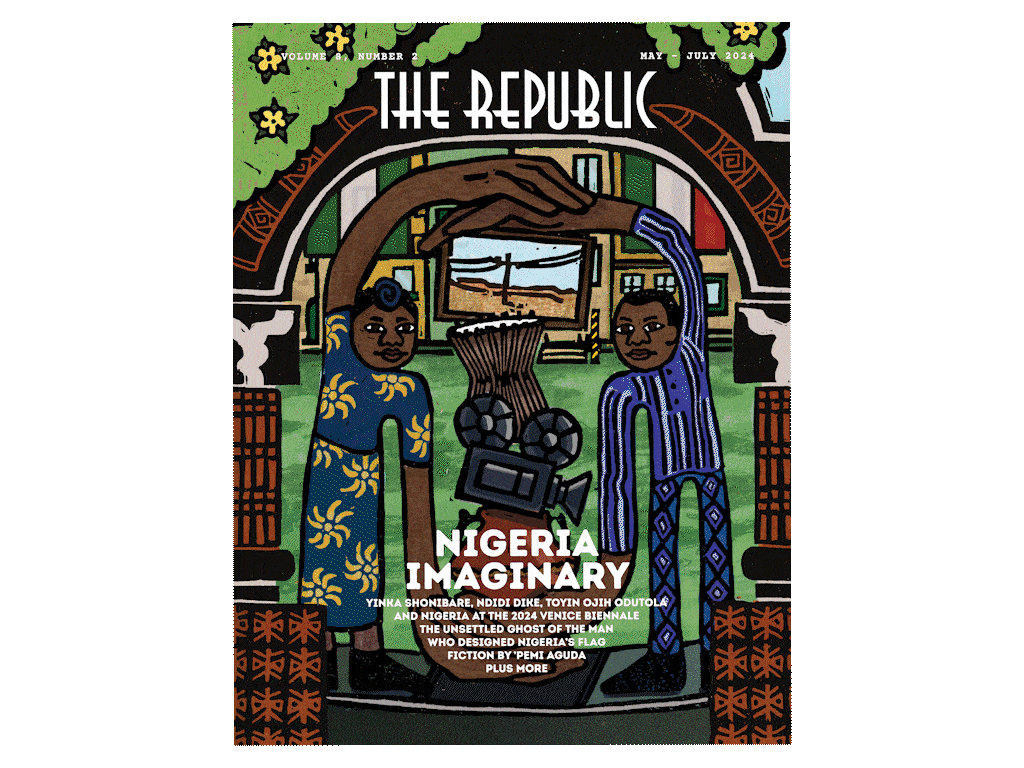 ₦10,000.00 – ₦30,000.00Select options This product has multiple variants. The options may be chosen on the product page
₦10,000.00 – ₦30,000.00Select options This product has multiple variants. The options may be chosen on the product page -
 ₦140,000.00 – ₦150,000.00Select options This product has multiple variants. The options may be chosen on the product page
₦140,000.00 – ₦150,000.00Select options This product has multiple variants. The options may be chosen on the product page




